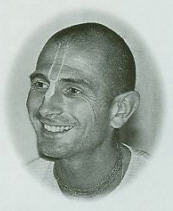
Rohininandana Dasa
MOST HARE KRSNA temples have rooms where guests are welcome to stay for a few days. What lodgings are available will differ from temple to temple. To arrange for your stay, it's best to get in touch with the temple in advance.
When you come, be prepared for some new sights and sounds. If your background isn't Indian, some of the traditional ceremonies and activities might at first seem strange, but most likely you'll find them easy to understand once they're explained.
Let's suppose you arrive early one evening. What are you likely to expect?
After settling into your room, which you might be sharing with other residents or guests, it might be time for the evening kirtana (chanting) in the temple and a class on Bhagavad-gita. After class you'll probably be offered a cup of hot milk and maybe an evening snack of prasadam, food offered to Krsna.
Try to get to bed early, because you'll want to rise early with the devotees to bathe, dress, and make it to the temple in time for mangala-arati, a worship ceremony that in most temples begins at 4:30. Don't let the prospect of such an early start put you off. You'll benefit from the age-old tradition of rising early for spiritual practices. By breakfast time you should have gained quite a taste of Krsna conscious insight and satisfaction.
After mangala-arati, which lasts about half an hour, the curtains or doors to the Deity chamber close. Then devotees worship tulasi, a confidential associate of Krsna who has appeared in this world in the form of a bush. While one devotee offers flowers, incense, and a flame, the others sing a centuries-old song in tulasi's glorification. During the ceremony the devotees walk around tulasi and each of them sprinkles a few drops of water on her roots.
The japa meditation period comes next. Japa means soft chanting. For one and a half to two hours devotees sit, stand, or walk while chanting the Hare Krsna mantra on meditation beads.
At 7:00 or 7:15 the curtains or doors to the Deity chamber open to reveal the freshly decorated Deities. A tape plays beautiful Sanskrit poetry set to music, and the devotees sing along or offer their own prayers. The devotees look at the Deities for a few minutes and then bow to the floor. Then each devotee receives in the palm a few drops of sanctified water and sips it.
Next comes a ceremony of worship for Srila Prabhupada. All ISKCON temples have a special seat called a vyasasana on which a picture or statue of Srila Prabhupada sits. Everyone offers a few flower petals to Srila Prabhupada's feet as an act of gratitude, especially for the teachings he has given in his books. During the ceremony the devotees sing a traditional song glorifying the spiritual master, followed by the chanting of Hare Krsna.
Next a devotee gives a lecture on a verse from the scripture Srimad-Bhagavatam. After the lecture, questions are encouraged.
Then it's time for breakfast, and then devotees go on with their service to Krsna. For devotees living and serving in a Hare Krsna community, daily activities vary greatly cooking, cleaning, gardening, teaching, worshiping the Deities, going out to spread Krsna consciousness. You may take part in these activities or spend your time reading or discussing Krsna conscious philosophy with devotees.
On Friday or Saturday nights devotees usually hold a chanting procession in a nearby city or town, winding their way through the crowds for an hour or so. The procession offers a unique chance to see Lord Krsna's material and spiritual energies side by side.
On Sundays comes the world-famous Hare Krsna Sunday feast. Devotees cook special dishes for the many guests who come. The devotees often put on plays or show videos or slide-shows.
Particularly good times to visit the temple are on Lord Caitanya's birthday (in February or March), Lord Krsna's birthday (August or September), and Rathayatra, the Festival of the Chariots (summer).
All in all, you should find that your stay at a temple, however brief, provides you a taste of the special pleasure of Krsna conscious life. You'll make friends and perhaps get more of an idea how to make your own life spiritually more successful.
Rohininandana Dasa lives in southern England with his wife and their three children. Write to him in care of Back to Godhead.
